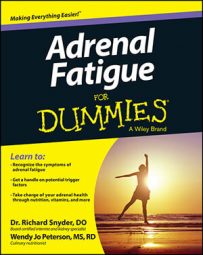Commonly prescribed medications, such as inhaled steroids and statin medications, are likely important in the development of adrenal fatigue. Let’s explore how steroid medications and statin medications influence adrenal fatigue.
Steroid medications’ role in adrenal fatigue
Physicians prescribe steroid medication such as prednisone to treat many conditions, from asthma and emphysema to debilitating forms of arthritis and lupus. Physicians know that when someone takes oral steroids for a few days, it decreases the ability of the adrenal glands to produce cortisol.
For many chronic conditions, people require multiple doses of oral prednisone. Many studies suggest that chronic use of orally prescribed steroids can affect the adrenal glands’ ability to produce cortisol.
Although much attention in the medical community has focused on oral steroids, little attention has focused on the effects of inhaled steroids and adrenal fatigue. Given that millions of children and adults are prescribed inhaled steroids to take daily for chronic lung conditions, it's important to understand the effects of long-term inhaled use on adrenal function.
In an article from the journal Allergy, Asthma, and Clinical Immunology published in 2010, researchers examined the role of inhaled steroids on the development of suppression of adrenal gland function; this means that the adrenal glands’ ability to produce cortisol is inhibited.
Children who've been on high doses of inhaled steroids for asthma can show effects of adrenal suppression. It's feasible that the adrenal suppression due to the use of inhaled steroids may contribute to adrenal fatigue over time. Inhaled steroids may affect the adrenal glands’ ability to produce cortisol when needed, in a similar way that oral steroids do, for up to one year after someone discontinues the inhaled steroids.
Statin medications’ role in adrenal fatigue
Statin medications are a commonly prescribed class of medications in the treatment of high cholesterol and heart disease. Cholesterol is the fundamental ingredient in the synthesis of hormones from the adrenal glands. Statin medications inhibit the synthesis of cholesterol, so could they play a role in the development of adrenal fatigue?
A study in the Archives of Internal Medicine in 2012 examined more than 1,000 individuals who were taking a statin medication. The authors looked at two medications, simvastatin (Zocor) and pravastatin (Pravachol). The authors noted that 40 percent of those taking simvastatin reported increased fatigue. Increased fatigue was reported with less frequency with pravastatin.
Was the reported fatigue simply a side effect of the statin medication itself, or did the medication affect the adrenal glands’ functioning, causing the fatigue? Two other lab-based studies may shed some light on this question.
In a 2003 article from the British Journal of Pharmacology, investigators felt that simvastatin decreased the sensitivity of the adrenal glands and decreased the secretion of aldosterone, a major adrenal hormone. A lab-based study from the Journal of Pharmacology and Experimental Therapeutics in 2008 noted that simvastatin can inhibit the production of the stress hormones epinephrine and norepinephrine, which are responsible for the fight-or-flight reaction.
If you are on a statin medication and are dealing with fatigue, ask your healthcare practitioner whether it would be prudent to discontinue the medication and have your adrenal function evaluated.

